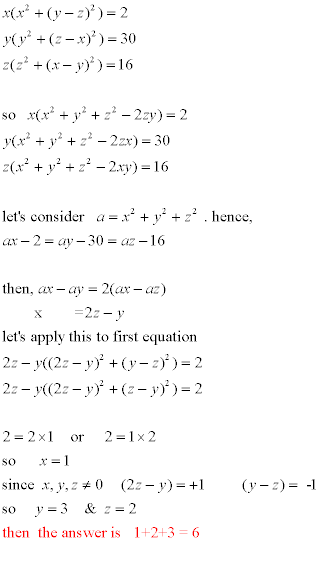Three Equations, Three Variables!
⎩ ⎪ ⎪ ⎨ ⎪ ⎪ ⎧ x 3 + x ( y − z ) 2 = 2 y 3 + y ( z − x ) 2 = 3 0 z 3 + z ( x − y ) 2 = 1 6
Find the sum of all real x , y , z for which the above system of equations satisfies.
The answer is 6.
This section requires Javascript.
You are seeing this because something didn't load right. We suggest you, (a) try
refreshing the page, (b) enabling javascript if it is disabled on your browser and,
finally, (c)
loading the
non-javascript version of this page
. We're sorry about the hassle.

Note that x , y , z = 0 . Then we can write equivalently the system as follows
⎩ ⎨ ⎧ x ( x 2 + y 2 + z 2 ) − 2 x y z = 2 y ( x 2 + y 2 + z 2 ) − 2 x y z = 3 0 z ( x 2 + y 2 + z 2 ) − 2 x y z = 1 6
⇔ ⎩ ⎨ ⎧ x ( x 2 + y 2 + z 2 ) − 2 x y z = 2 ( y − z ) ( x 2 + y 2 + z 2 ) = 1 4 ( z − x ) ( x 2 + y 2 + z 2 ) = 1 4
⇔ ⎩ ⎨ ⎧ x ( x 2 + y 2 + z 2 ) − 2 x y z = 2 ( y − z ) ( x 2 + y 2 + z 2 ) = 1 4 y = 2 z − x
⇔ ⎩ ⎨ ⎧ 2 x 3 − 2 x 2 z + x z 2 = 2 − 2 x 3 + 6 x 2 z − 9 x z 2 + 5 z 3 = 1 4 y = 2 z − x
⇔ ⎩ ⎨ ⎧ 2 x 3 − 2 x 2 z + x z 2 = 2 5 z 3 − 1 6 x z 2 + 2 0 x 2 z − 1 6 x 3 = 0 y = 2 z − x
As x , z = 0 , put t = x z , we have:
5 t 3 − 1 6 t 2 + 2 0 t − 1 6 = 0 ⇔ ( t − 2 ) ( 5 t 2 − 6 t + 8 ) = 0 ⇔ t = 2
Hence z = 2 x and the system is equivalent to
⎩ ⎨ ⎧ 2 x 3 − 2 x 2 z + x z 2 = 2 z = 2 x y = 2 z − x ⇔ ⎩ ⎨ ⎧ x = 1 y = 3 z = 2
So, the answer is 1 + 2 + 3 = 6 .